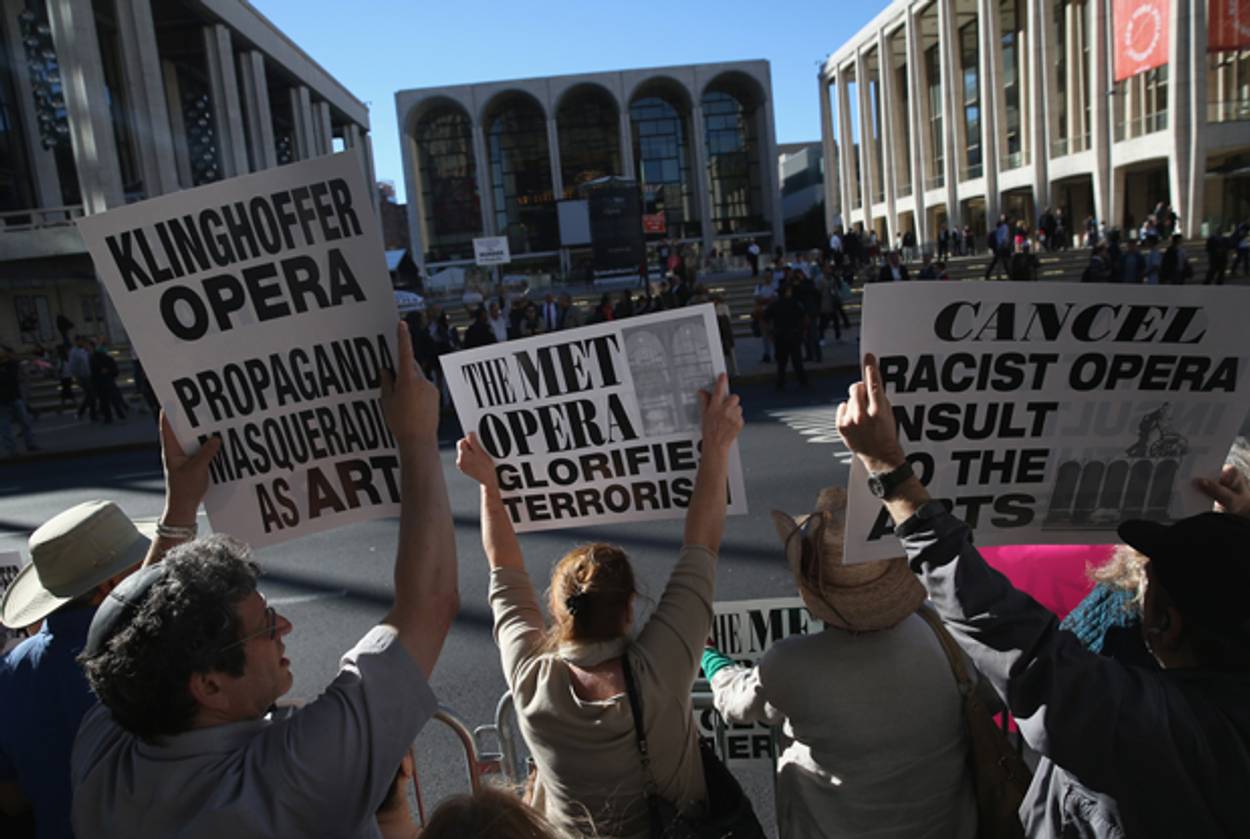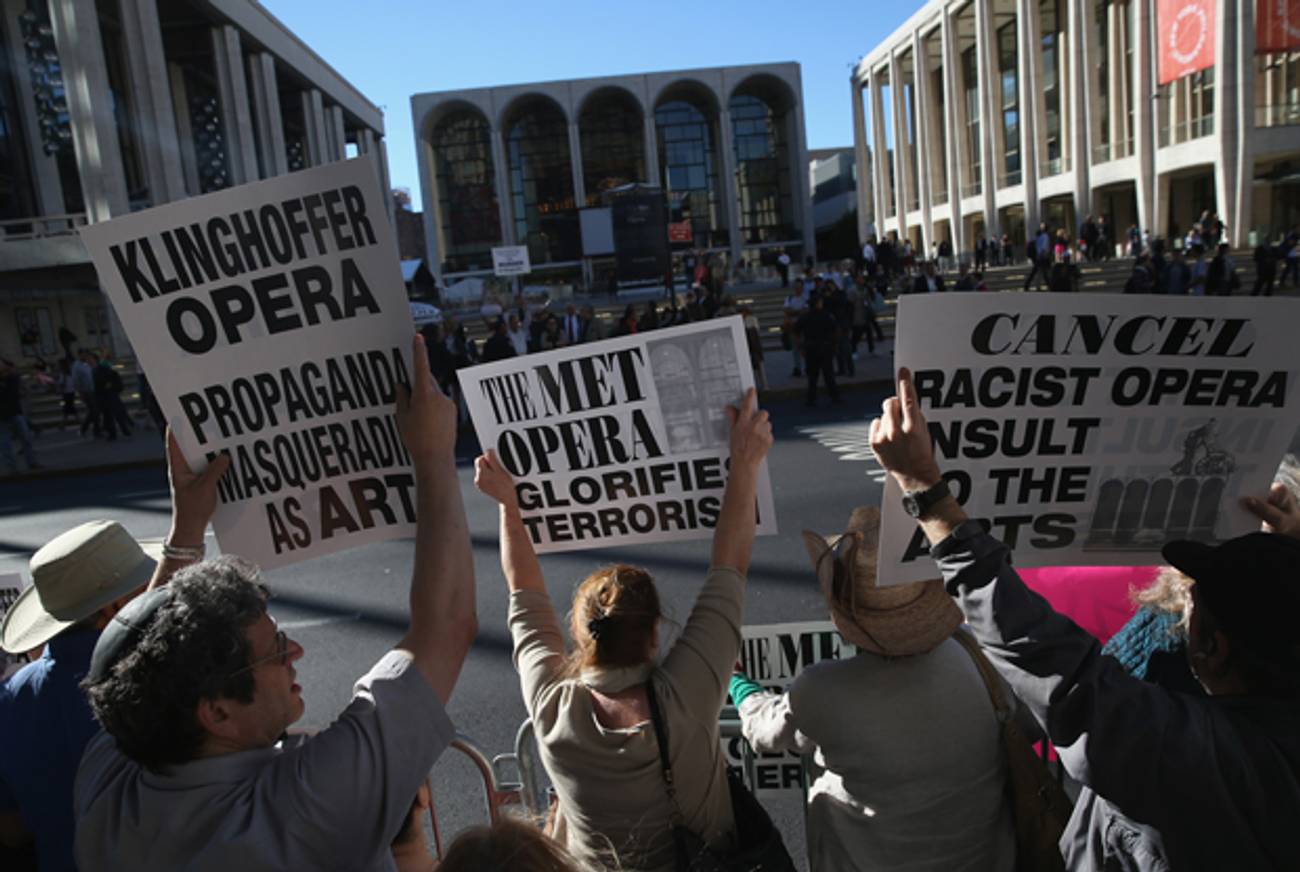Protest Against ‘Anti-Semitic’ Opera in NYC
Controversial Met Opera production said to be sympathetic to terrorism




A group of nearly 1,000 people gathered across the street from Lincoln Center Monday evening, not to attend the opening night of the Metropolitan Opera’s fall season, but to protest the New York City institution’s decision to keep The Death of Klinghoffer in their fall lineup. (The Met agreed to cancel a scheduled international online simulcast in November.)
The controversial opera, which was composed by John Adams, depicts the 1985 hijacking of an Italian cruise ship by the Palestinian Liberation Front and the murder of Leon Klinghoffer, a wheelchair-bound Jewish passenger.
“I knew Klinghoffer” said Hyman Silverglad, an attorney who lives in Manhattan’s East Village. “People don’t know how much of an asset he was to America.”
The protesters argue that the opera is both sympathetic towards terrorism and anti-Semitic in its exploitation of the death of a Jewish man. “It is propaganda masquerading as art,” said Dr. Eve Epstein, a communications specialist.
The crowd began to gather around 4:30 p.m and quickly expanded as people left work and schools let out for the day. As the crowd grew, police extended the barricade into the first lane of traffic on Broadway.
Three local yeshivas brought buses carrying several hundred students. “Over-acceptance of people who are not accepting is not acceptable” said one student from Rambam, a boys school on Long Island. Many students were up to date on the controversy, although none I spoke with had read or seen the opera.
Protesters carried signs that read “Shame on Peter Gelb,” the Met Opera’s general manager, and called for his firing, while others referred to the Met as the “Metropolitan Nazi Opera.” Some demonstrators wore yellow stars with the phrase “Never Again,” reminiscent of the yellow stars Jews were forced to wear during the Holocaust.
Political and religious officials spoke during the protest as well. Representative Eliot L. Engel of New York, New York State Assemblyman Dov Hikind, and former Governor George Pataki all denounced the Met’s decision, as did Catholic League President Bill Donohue.
But some attending the demonstration went one step further, using the legitimate concerns of the exploitation of tragedy to put forth a political message that, at times, bordered on the absurd. One sign claimed that “9/11: The Musical” would be coming to Lincoln Center soon. Jeff Wiesenfeld, who helped organize the event, urged the crowd to “be here every night until the set is burned to the ground,” and later wondered if the Met might someday put on a production entitled: “ISIS: a love story.” An anonymous donation to help fund The Death of Klinghoffer was speculated to have been funded by terrorist organizations.
Across the street, opera-goers arriving at Lincoln Center appeared surprised by the crowd, and some were unaware of the controversy entirely. One remarked that he thought “the labor issues had been settled already”—the Met recently reached an agreement on a new labor contract with two of its unions—before proceeding into the theater with little issue.
Others were not as lucky. As the 6:15 p.m. curtain approached, a number of protesters crossed the street to the Lincoln Center plaza, where some handed out flyers while others shouted “shame on you” at patrons, accusing them of “supporting terrorism.” One particularly embarrassed tuxedoed man, who was aware of the controversy and sympathized with the protesters, said “they should protest at the Klinghoffer opera, not opening night.” A group of three women found it “ridiculous” that they were targeted for simply going to see Mozart’s “Le Nozze di Figaro.” There “is no need for the personal attacks,” one of the women said.
“Art is supposed to be provocative,” she added before heading in for the performance.
It certainly was last night.
As of now, The Death of Klinghoffer is still scheduled to begin performances October 20.
Zack Schrieber is an intern at Tablet Magazine. Follow him on Twitter @zschrieber.
Related: Understudy
Zack Schrieber is an intern at Tablet Magazine. Follow him on Twitter @zschrieber.